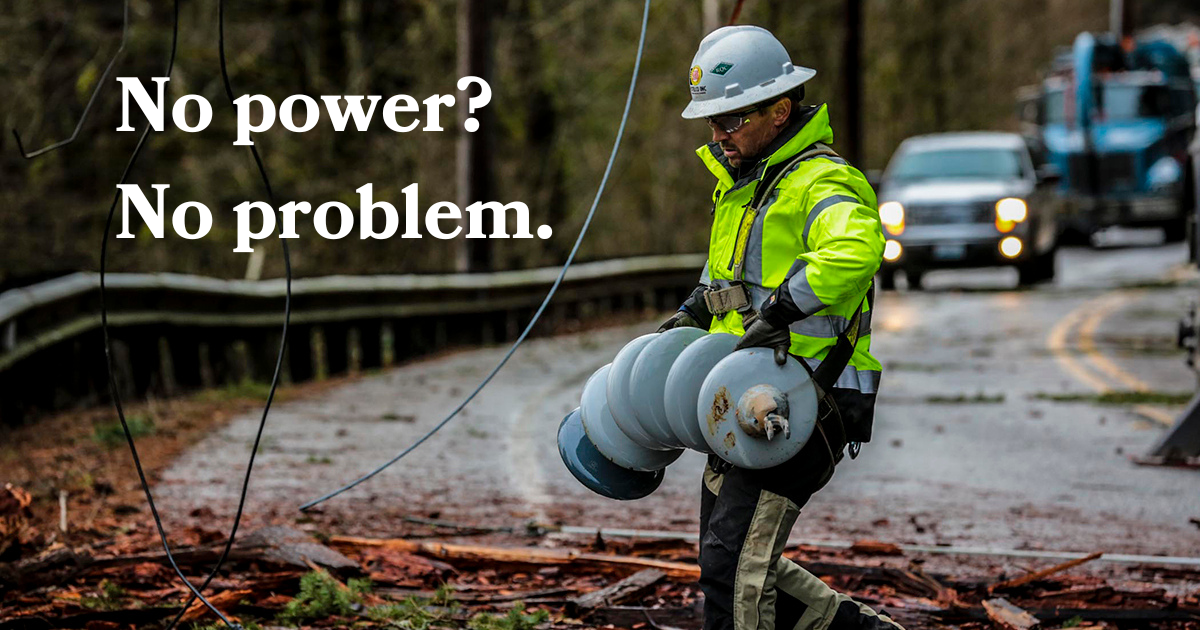
Whether it’s windy outside or completely random, power outages can be frustrating and inconvenient. Losing power disrupts our daily routines, affects our access to technology, compromises our comfort and can lead to food waste.
In Issaquah Highlands, wind gusts can occur at any time throughout the year due to our proximity to the Cascade Mountain Range. Rain and wind are a regular part of living in Western Washington, so it’s important to be prepared when the next big storm hits!
Puget Sound Energy (PSE) is responsible for managing power outages and electrical safety in our community, among other services. In the event of an outage, the energy utility company is committed to early alerts and quick responses. Download the myPSE app to track and report outages, check status and get estimated restoration times, or visit the outage map.
As PSE prepares for power outages, they encourage customers to do the same.
Prepare Before an Outage
Make sure to have emergency supplies on hand at home and in your vehicle. Building your own emergency kit will come in handy. Here are some items to include:
- Water (account for one gallon per person, per day)
- Non-perishable food
- Flashlights (always use flashlights instead of candles)
- Radio (battery-powered or hand-crack)
- Extra batteries
- First aid kit
- Sturdy shoes, gloves
- Wrench to turn off utilities, such as natural gas or water
- Moist towelettes, garbage bags and plastic ties for sanitation
- Manual can opener
- Multipurpose (A-B-C) fire extinguisher
- Unique family needs (supplies for infants, pets; prescription and over-the-counter medications; emergency phone numbers, important documents)
Stay Safe During an Outage
- Never touch or go within 35 feet of downed power lines because they might be energized. Call PSE at 1-888-225-5773 or 911 to report problems.
- Turn off lights and unplug all appliances and sensitive electronic equipment, such as computers, to prevent an overload on your circuits when electric service is restored. Leave one light on to let you know when service returns.
- Avoid opening and closing refrigerators and freezers more often than necessary. A closed refrigerator will stay cold for up to 12 hours.
- Don’t use a charcoal or gas grill to cook indoors. Never use a natural gas range for heating, or charcoal as an indoor heating source. This can cause a buildup of poisonous carbon monoxide gas.
- Avoid operating portable generators indoors or in enclosed spaces to avoid the buildup of carbon monoxide.
- Keep portable heaters away from furniture, draperies and other flammable materials.
- Close curtains and drapes to keep the heat in. Wear warm clothes in layers.
- If the indoor temperature drops to 55 degrees or below, open your faucets so there is a constant drip to prevent pipes from freezing.
Charge cell phones, mobile devices, power banks and laptops in case the power goes out.
In an effort to prevent outages, PSE performs year-round vegetation management as well as pole and wire replacement. If you see a tree that appears dangerously close to powerlines, fill out this contact form for PSE to investigate.
Get additional information on ways you can prepare as well as storm resources here:





